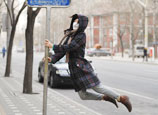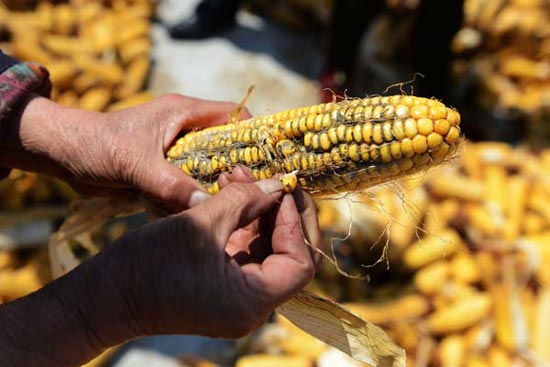
WASHINGTON, May 13 (Xinhua) -- While central banks worldwide have cut rates and weakened their currencies in response to the plummeting Japanese yen, China has stood firm, confident that its economy, the world's second biggest, can withstand current global weakness, a leading economist says.
A WAVE OF INTEREST RATE CUTS
Central banks in the eurozone, India, Australia, South Korea, Poland and Israel have cut rates in recent weeks, amid lower-than-expected global growth and Yen's sharp depreciation, which fueled competitive devaluation concerns.
"I think it's a trend that has been going for a while," Felix Huefner, deputy director of global macroeconomic analysis at the Institute of International Finance (IIF), a global association of more than 450 financial institutions, told Xinhua in a recent interview.
"The big background is that growth in the mature economies is very weak. The domestic demand is very weak. That's because of fiscal consolidation, and you have problems in the banking sector. So that's why all the central banks of the G3 (United States, eurozone and Japan) have lowered interest rates closer to zero and launched unconventional monetary policies," Huefner said.
The U.S. Federal Reserve is currently buying 85 billion U.S. dollars worth of long-term bonds to push down borrowing costs and boost the housing market. The Bank of Japan unveiled a series of more aggressive easing measures in April, aiming to double its monetary base over the next two years to end nearly two decades of deflation in Japan.
Because of these measures, "money flows out of mature economies into emerging markets. And emerging markets are responding by lowering interest rates," Huefner said.
When a country cuts interest rates, it reduces the appeal to investors of holding the currency and weakens the currency.
Huefner also said the European Central Bank (ECB), and the central banks of South Korea and Australia cut interest rates partly because of the yen's depreciation against their currencies. The yen has depreciated about 30 percent against the U.S. dollar since early October 2012.
CHINA STANDING PAT
Although more central banks from emerging economies are likely to join the latest wave of interest rate cuts, economists didn't think the People's Bank of China (PBOC), China's central bank, would follow suit in the near term.
Feng Guo, senior economist of the Asia/Pacific Department of Washington-based IIF, told Xinhua China's first quarter gross domestic product (GDP) growth of 7.7 percent year on year was not very low, still above the government's 7.5 percent target. But inflation was the major concern for the PBOC as China's Consumer Price Index (CPI) rose 2.4 percent year-on-year in April.
Guo also believed yen's depreciation had limited impact on China's economy as the Bank of Japan's monetary easing was less powerful than the Fed and the yen was far less important than the U.S. dollar as an international reserve currency.
"The importance of exports to Japan has declined for China over the past 10 years. Japan was China's fifth largest export market in 2012," Guo said.
He noted the direct competition between manufacturing industries in China and Japan was also limited as Japan mainly exported high-end and value-added products.
However, interest rate differentials would become bigger between China and other major economies which cut interest rates recently, attracting more speculative capital into China and putting the RMB yuan under further appreciation pressure, Guo said.
NEW THINKING
Huefner predicted the central banks in advanced economies would also maintain rates for the foreseeable future as lower interest rates couldn't solve all the problems.
"In terms of rates, the outlook is stable, but central banks will become more innovative. There's a period where central banks have reached their limit," Huefner said.
"You lower interest rates and lending to small companies does not pick up," he said of the Bank of England's Funding for Lending Scheme (FLS), launched last July to boost lending to the real economy.
"That requires new thinking, new instruments. The ECB is now thinking of supporting SMEs (small and medium sized enterprises) lending. So options and changes in this respect we think could be forthcoming," Huefner argued.
"It's not traditional interest rate lowering. It's not traditional quantitative easing. It's something more targeted," he said.
ECB president Mario Draghi recently said the ECB was considering buying asset-backed securities among possible options to support lending to SMEs, which was critical to bring unemployment down in the eurozone.
















 Father arrested for 'torturing' teen daughter
Father arrested for 'torturing' teen daughter


![]()
